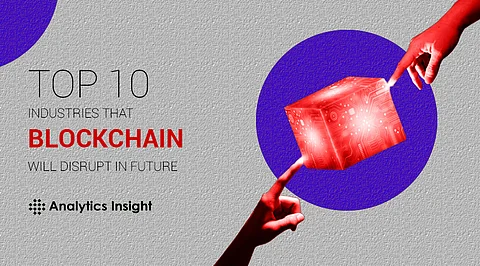
- Insights
- Cryptocurrencies
- Stocks
- White Papers
- Industry
- Geography
- Insights
- Cryptocurrencies
- Stocks
- White Papers
- Industry
- Geography


Blockchain technology is rapidly growing its popularity However; it is also beginning to challenge business practices. Many industries are discovering that blockchain technology is superior to current methods for completing critical elements of work. In this article, we have explained the top ten big industries that blockchain will disrupt in the future. Read this article to know more about the top 10 industries that blockchain will disrupt
Blockchain has the potential to provide financial services to billions of people worldwide, including those in third-world countries who do not have access to traditional banking. Bitcoin enables anyone to send money across borders almost instantly and at a low cost.
Many banks, including Barclays, are working to implement blockchain technology to make their business operations faster, more efficient, and more secure. Banks are also becoming more interested in blockchain startups and projects. According to IBM, by the end of 2017, 15% of banks will be using blockchain.
Transactions can be documented in a permanent decentralised record and monitored securely and transparently using blockchain technology. This can significantly reduce time delays and human errors. It can also be used to track costs, labor, waste, and emissions at every stage of the supply chain. This has serious implications for understanding and controlling a product's true environmental impact. By tracking products from their origin, the ledger can also be used to verify their fair-trade status or authenticity. SKUChain, Provenance, Fluent, and Blockverify are some blockchain companies working in this space.
Even though the blockchain ledger is open to the public, the data is verified and encrypted using advanced cryptography. As a result, the data has fewer chances to get hacked or changed without authorization. However, blockchain-based applications are still in their early stages, and there have been several hacks in recent months. Future applications will need to mature in this area.
The blockchain is set to revolutionise research, consulting, analysis, and forecasting. Augur and other online platforms are attempting to establish global decentralised prediction markets. These technologies can be used to decentrally place and monitor bets on anything from sports to stocks to elections.
The global insurance market is built on trust. The blockchain is a new way of managing trust that can be used to validate many types of data in insurance contracts, such as the identity of the insured person. Oracles can also be used to connect real-world data to blockchain smart contracts. This technology is extremely useful for any type of insurance that is based on real-world data, such as crop insurance. Aeternity is developing tools for the insurance industry as a blockchain project.
Data stored on a centralised server is prone to hacking, data loss, and human error. Using blockchain technology makes cloud storage more secure and resistant to attacks. Storj is an example of a cloud storage network that makes use of the technology.
Government systems are frequently slow, opaque, and corrupt. Implementing blockchain-based systems has the potential to significantly reduce bureaucracy while also improving the security, efficiency, and transparency of government operations.
Healthcare is another industry that relies heavily on legacy systems and is ripe for disruption. One of the challenges hospitals faces is a lack of a secure platform for storing and sharing data, and they are frequently targets of hackers due to outdated infrastructure. Blockchain technology has the potential to enable hospitals to securely store data such as medical records and share them with authorised professionals or patients. This can enhance diagnostic accuracy, improve data security, and even enhance speed. Gem and Tierion are two companies working to disrupt the current healthcare data landscape.
When you go shopping, your faith in the retail system is linked to your faith in the store or marketplace. Decentralized blockchain-based retail utilities operate uniquely: they connect buyers and sellers without the use of a middleman and the associated fees. In these cases, trust is derived from smart contract systems, exchange security, and built-in reputation management systems. OpenBazaar is one retail-disrupting startup
For a long time, energy management has been a highly centralised industry. Energy producers and users cannot buy directly from one another and must instead use the public grid or a trusted private intermediary. TransactiveGrid is an Ethereum-based startup that allows customers to buy and sell energy from one another on a peer-to-peer basis.
